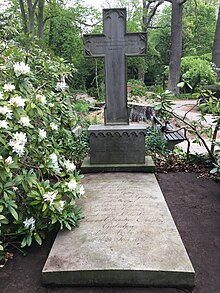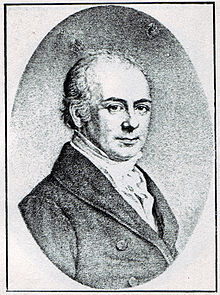Anton Diedrich Gütschow

Anton Diedrich Gütschow (born November 14, 1765 in Lübeck ; † November 8, 1833 there ) was Mayor of Lübeck.
Life
Anton Diedrich Gütschow was the son of the businessman and senator Carl Abraham Gütschow . From October 1784 he studied law at the University of Jena and from 1786 at the University of Göttingen , where he received his doctorate in 1788. iur. received his doctorate.
He returned to Lübeck and was first procurator of higher and lower court in 1789, then in 1802 city syndic of Lübeck. After Lübeck had become part of the French Empire in 1811 and an administration based on the French model was set up, Gütschow was given the post of mayor or mayor , which he held until Lübeck was first liberated from French rule on March 19, 1813. When the city was again occupied by French troops on June 3, Gütschow was supposed to take over the office again, but was no longer in Lübeck, so that his deputy Dr. Meyer plug into office led until July 7, the physician Friedrich Adolph von Heintze on the orders of Louis-Nicolas Davout appointed provisional mayor was.
After Lübeck had regained its independence, Gütschow again took over the position of city syndic , which he held until his death in 1833. As envoy he represented the Hanseatic city of Lübeck in Copenhagen (1807), Paris (1811), Hanover (1816) and at the Bundestag of the German Confederation in Frankfurt am Main (1819/23).
In 1789 he was one of the founders of the Society for the Promotion of Charitable Activities and gave numerous lectures on legal, political and historical topics at its meeting evenings. From 1791 and from 1794 to 1798 he was the Society's secretary and its director in 1802/03. He played a leading role in the transformation of the public benefit from a literary society to a socially diverse association.
Since 1792 he was married to Christine Margarete, geb. Plessing, a daughter of Mayor Johann Philipp Plessing . His son, Carl Philipp Gütschow, was a doctor in Lübeck and is known in the Buddenbrooks as Dr. Grabow described. The Lübeck councilor Heinrich Albrecht Gütschow was his younger brother, his son, the council secretary Carl Hermann Gütschow , his nephew. Gütschow was one of the first on until 1834 officially opened Burgtorfriedhof buried.
Fonts
- Studia Lubecensium promovendi commercia. Diss. Göttingen 1788
- Brief description of the character and life: Weiland Sr. Magnificenz der Wohlgebohrnen und Hochwagen lord, Mr. Anton Diedrich Wilcken meritorious mayor of the imperial free imperial city of Lübeck , Green , Lübeck 1792
- Dedicated to the memory of Mr. Carl Abraham Gütschow: Member of the Senate of the Imperial City of Lübeck , Lübeck 1798
- Sr. Magnificenz Mayor JM Tesdorpf at the occasion of the celebration of his 50th anniversary in office , 1823
literature
- Friedrich Bruns : The Lübeck syndicists and council secretaries until the constitutional amendment of 1851. In: ZVLGA Volume 29 (1938), p. 91 (116ff.).
- Emil Ferdinand Fehling : On the Lübeck Council Line 1814-1914. Lübeck 1915, No. 11.
- Johannes Warncke: Lübeck's liberation from French rule . Publishing house Gebrüder Borchers, Lübeck 1913
- Helmut Stubbe da Luz : Gütschow, Anton Diedrich in Biographical Lexicon for Schleswig-Holstein and Lübeck , Volume 13, Wachholtz, Neumünster, pp. 182-188
- Rüdiger Kurowski: Medical lectures in the Lübeck Society for the Promotion of Charitable Activities 1789-1839: a patriotic society during the Enlightenment and Romanticism. Schmidt-Römhild, Lübeck 1995 ISBN 3-7950-0463-2 , pp. 133f
| personal data | |
|---|---|
| SURNAME | Gütschow, Anton Diedrich |
| BRIEF DESCRIPTION | German politician and mayor of Lübeck |
| DATE OF BIRTH | November 14, 1765 |
| PLACE OF BIRTH | Lübeck |
| DATE OF DEATH | November 8, 1833 |
| Place of death | Lübeck |
